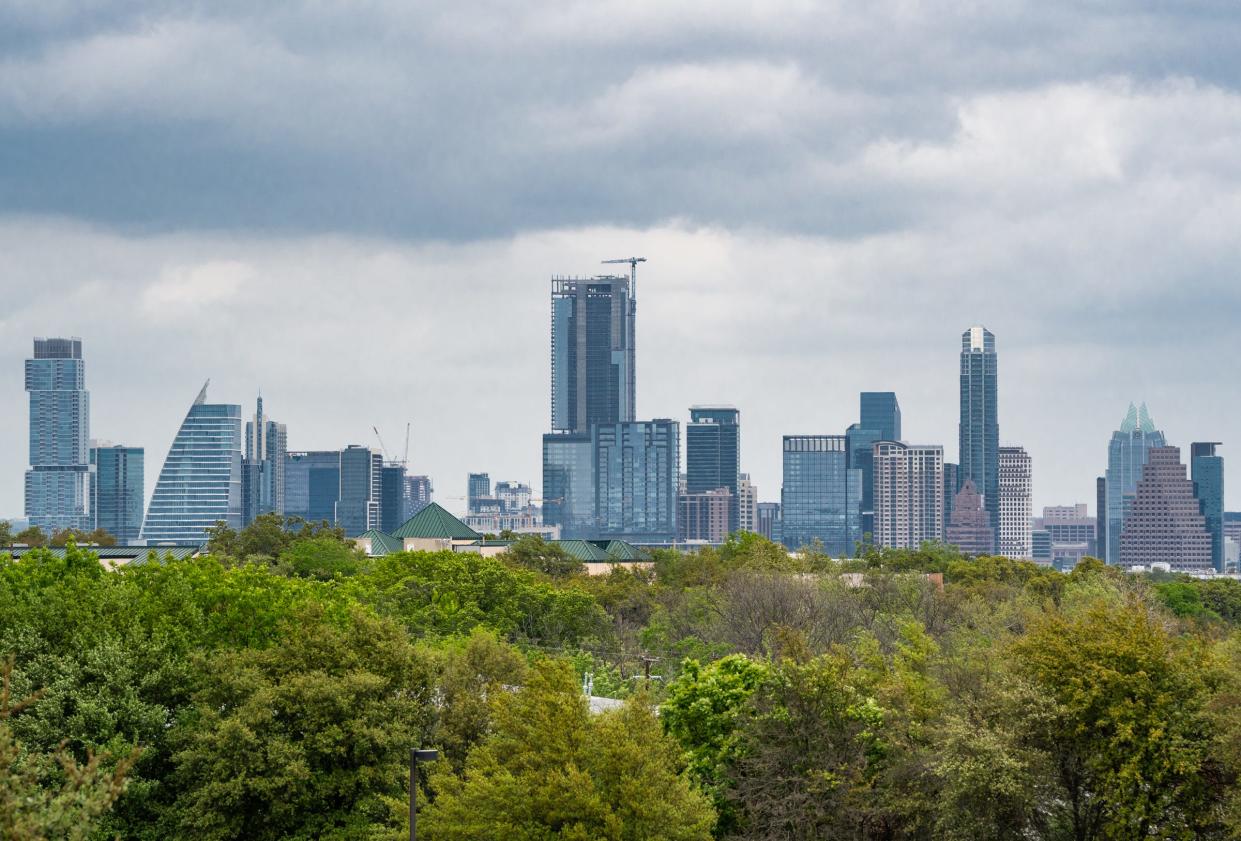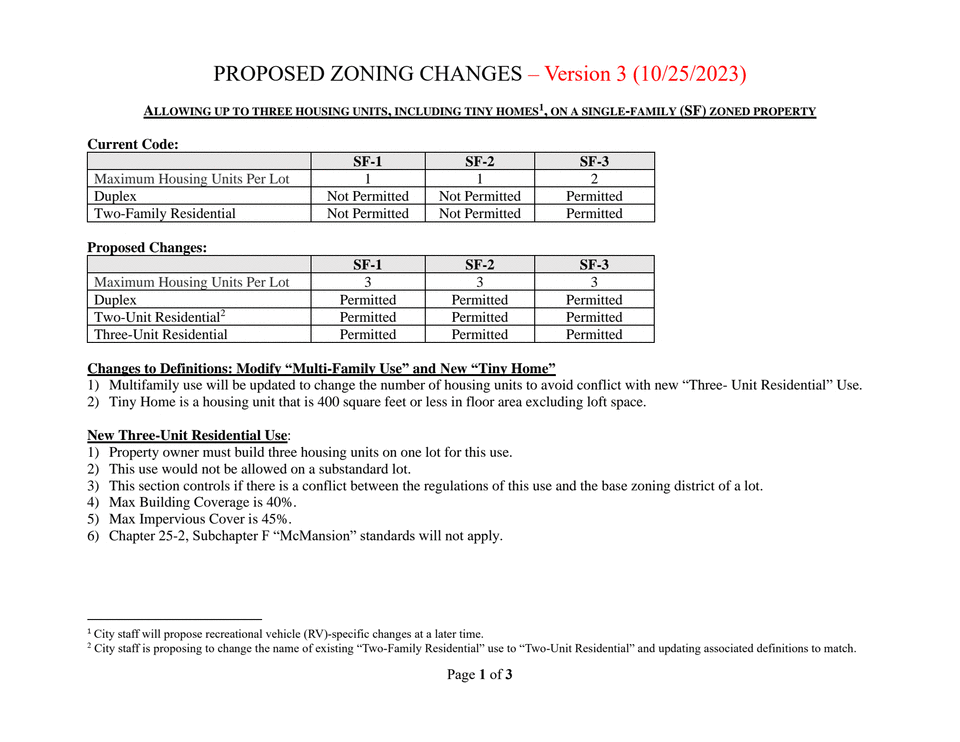Austin wants to change its land development code again. Here's how residents are reacting.

Editor's note: This story has been updated to reflect that the city is not currently considering land development code changes allowing RVs on single-family lots.
Many city leaders think the solution to Austin's affordable housing crisis in part lies in the land development code — which dictates what can be built and where, and how big it can be — and they are again embarking on an attempt to amend the code to allow for more and different kinds of housing.
In what Austin Mayor Kirk Watson said he believes is a first, the City Council and the Planning Commission packed into the City Council Chambers on Thursday for a joint meeting dedicated only to hearing public feedback on the proposed changes and a brief presentation from the city staff.
The first of three public hearings, the seven-hour joint meeting focused on the changes — including allowing up to three housing units, such as tiny homes, on single-family lots — drew hundreds of Austinites to City Hall.
"Arguably, this is just the beginning," Watson said at the end of Thursday's meeting.
Past attempts to make changes, such as CodeNext, have been highly controversial — perpetuating the argument between those who support more housing density and those against it.
Supporters at Thursday's hearing said the changes would help create more affordable housing — a view shared by a majority of the City Council.
Opponents argued that it could raise property taxes, and some saying developers won't build affordable housing without incentives.
Of the 396 people who participated — testifying in person or remotely, or signing up in favor or against but not testifying — nearly 55% supported the proposed changes to the code, according to data from the city.
Here are the changes the city is proposing and what Austinites are saying about it.
More: Here’s how the Austin City Council voted on ‘first step’ to land development code changes
What are the proposed land development code changes?
There are several proposed changes to the land development code, including:
Allowing up to three housing units, including tiny homes, on a single-family zoned property.
Revising regulations that apply to a property with two housing units — including reducing the minimum lot size for duplexes from 7,000 square feet to 5,750 square feet.
Removing restrictions on the number of unrelated adults living in a housing unit.
Page 1 of Austin Proposed Land Development Code Changes Oct. 26, 2023

Contributed to DocumentCloud by Chase Rogers (Austin American-Statesman) • View document or read text
Austinites weigh in on the proposed changes
A key takeaway from Thursday's public hearing is that many Austinites want more affordable housing. They differ, however, on the way to achieve that goal.
Supporters of the changes say that amending the code is one of the first steps to creating more affordable housing options.
Luis Osta Lugo, a District 8 resident, software engineer and housing advocate who testified at Thursday's hearing, told the American-Statesman that a first step in addressing affordable housing is giving people more options.
"That's partially creating more family-oriented apartments, that's partially allowing people to have and live in and build duplexes, triplex, courtyard condos," Osta Lugo said.
District 3 resident Edgar Handal said, "The lots that are now developed as single-family homes ... I've seen listings as high as 1½ to 2 million dollars.
"I think then that the next natural step, as it makes sense to me, would be to move to three units per lot or even more," Handal said.
Others think the changes will have the opposite effect on the affordability goals the city is trying to achieve.
"These changes will increase Austin's cost of living, eliminate the possibility of homeownership for working and middle-class earners," said Sean McCarthy, a District 7 resident.
District 10 resident Anne Budroni said, "I just don't think this is going to guarantee the affordable housing that we want."
A city affordability impact statement asserted that the changes would have a positive impact on development costs, might have mixed impacts on affordable housing, and might have a negative impact on homeowners experiencing precarity and some renters.
"Increasing entitlements may incentivize rental property owners to redevelop occupied single-family units," the statement says. "This could be mitigated by providing bonus entitlements to incentivize preservation."
What is the HOME initiative?
HOME — Home Options for Middle-income Empowerment — is a two-part initiative spearheaded by District 7 Council Member Leslie Pool. The first part, which was up for discussion at the meeting Thursday, would raise the number of units allowed on single-family lots to three.
The second part has a proposed reduction in the minimum size of single-family lots from 5,750 square feet to 2,500 square feet, which city staffers anticipate will not be taken up until at least spring of 2024.
Protest rights in Texas
Texas law requires municipalities to provide notice of proposed changes relating to zoning, and property owners can then protest those proposals.
People are eligible to sign a petition if they own property that will be covered by the proposed changes or if they own property within 200 feet of property that will be affected, according to the city's protest filing page.
The minimum number of petitions is met if owners of 20% of the area of lots or land covered by the proposed change submit verified signatures, according to the city, or if owners of 20% of the area of lots or land within 200 feet of the area covered by the proposed change submit verified signatures.
A simple majority vote of the City Council (six of the 11 members) is required to approve the change if the city does not receive the minimum number of petitions against the proposed change, according to the protest filing page. If the required number of petitions is met, a supermajority vote (nine of 11 members), or a three-fourths vote, is required to approve the changes.
The recently passed resolutions initiating the code changes and directing the city staff to draft amendments have generally received nine or more votes from council members — including Pool's HOME initiative resolution, which passed 9-2 during a July meeting.
The city is accepting petitions via mail or hand delivery to the Planning and Zoning Department.
Petitions must be filed by 4:45 p.m. Dec. 6. If sent by mail, they must be postmarked by Nov. 30.
Legal issues
Past attempts to change Austin's land development code have resulted in lawsuits.
In 2019, a group of homeowners filed a lawsuit against the city relating to a code rewrite.
In a March 2020 ruling on the case, state District Judge Jan Soifer ruled that the city's plans for a comprehensive rewrite of the code were in violation of state law because residents were denied the opportunity to protest.
The city appealed the ruling, which in 2022 was affirmed by a Texas appeals court — again saying that the city unlawfully denied residents their right to protest changes a majority of the council at the time wanted to make.
Could four Austin zoning regulations be overturned? Judge takes time to review the case
The same homeowners are now seeking a motion to enforce, which could void four city zoning ordinances, including affordability unlocked and the vertical mixed-use II ordinance.
Watson has said that one of his priorities as the council again tries to amend the code is to get in front of the problems that have occurred in the past.
This month, the city mailed more than 725,000 purple notices alerting residents to proposed code changes.
On Wednesday, however, Doug Becker, the attorney representing the homeowners, sent a letter to the mayor and the council saying that the recent attempts to change the code violate state law — this time because the city is not accepting electronic protest filings.
"There is no requirement that the writing be in hard copy form. In addition, state law authorizes the use of electronic records and signatures whenever a written document is required," Becker wrote in his letter.
What is the purple notice from the city? What it means, and why it was sent.
When are the next public hearings?
There are currently two more public meetings scheduled to discuss the proposed changes:
A Planning Commission meeting at 6 p.m. Nov. 14 at City Hall, 301 W. Second St.
A City Council meeting at 10 a.m. Dec. 7 at City Hall.
There will also be an open house to discuss the changes from 6 to 8 p.m. Nov. 6 at the Austin Central Library, at 720 W. Cesar Chavez St.
This article originally appeared on Austin American-Statesman: Austin wants to change land development regulations. What to know

